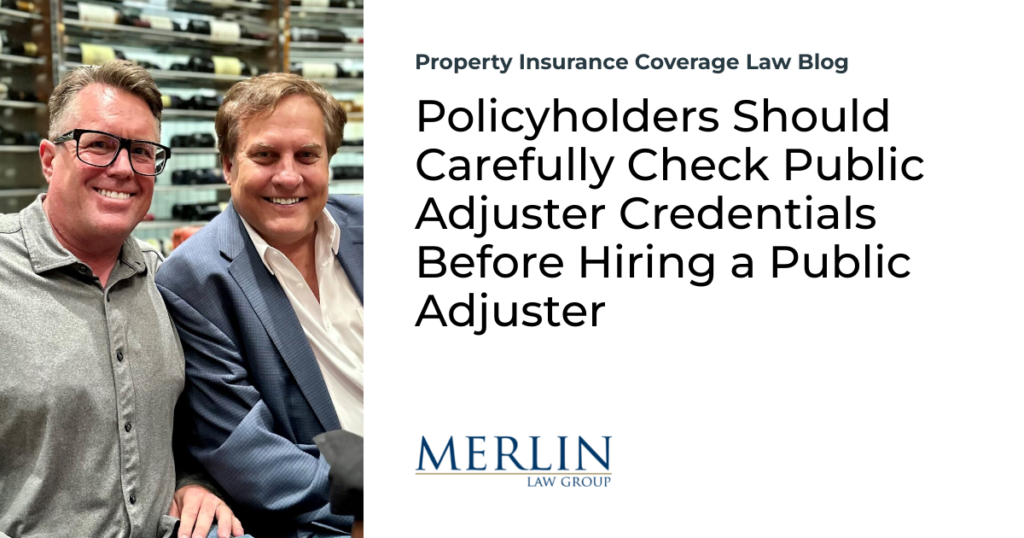Policyholders Should Carefully Check Public Adjuster Credentials Before Hiring a Public Adjuster

The question for most policyholders following a property loss should be, “Which public adjuster do I hire?” rather than “I had a loss, what do I do now?” The vast majority of policyholders will benefit from hiring a very competent public adjuster following a loss. I made this point in my book, Pay Up!:
Hiring a public adjuster has several advantages.
First and foremost, they work for you and not the insurance company. Today most insurance company adjusters are under tremendous pressure to pay less in benefits. In a perfect world, all insurance adjusters assess claims accurately, cover losses in full, and ensure that policyholders get the entire benefit due. But we don’t have a perfect world. In the real world, the insurance company claims managers often train adjusters to lower the company’s obligations to you.
Second, public adjusters can help you through the claims process and make sure you meet your obligations on time. After suffering a loss, you are required to mitigate further losses and damage. You may have limited time to make a claim, file reports, challenge an assessment, or meet other obligations. Public adjusters guide you through this process and get paid to do much of it for you. Many people simply don’t have the time to do these things themselves. Many business owners and homeowners don’t have time to dig through the rubble after a structure burns down. Public adjusters return to the scene of the loss to prepare detailed estimates. They’ll file paperwork to meet deadlines required by the policy.
Third, they have experience that customers do not. They understand the claims process and can guide policyholders through it. They are trained to look for and find hidden damage that may not be readily apparent. They know what policies typically cover and how to document a loss properly. Fourth, they are better able to negotiate with the insurance company. Most policyholders simply aren’t experienced and trained to negotiate the fairest deal with the insurance company. Insurance company adjusters are experts at getting claims settled as low as possible. You need an expert to make sure you get the full benefit due and that nothing is overlooked. Sometimes, as Dick Tutwiler was able to do for his optometrist client, they are able to get policyholders benefits they didn’t know existed.1
For policyholders, the essential question is, “Which public adjuster should I hire?” Credentials are crucial. Be wary of social media advertisements featuring public adjusters flaunting large checks. This isn’t always a sign of success. In fact, some internet-advertising public adjusters may give an illusion of expertise, playing on emotional greed purely for sales, suggesting they achieve superior outcomes. In reality, they might not be securing the best possible settlements. For instance, settling a $10 million claim for $5 million might appear impressive, but it means they missed out on half the potential settlement.
A takeaway for policyholders: The most proficient public adjusters often negotiate private settlements and maintain the confidentiality of settlement amounts. It’s the law to keep these figures private unless you agree otherwise.
Public adjusters should be committed to ongoing personal growth and improvement. I recently dined with Brett Allen, a member of the Rocky Mountain Association of Public Insurance Adjusters (RMAPIA) and the National Association of Public Insurance Adjusters (NAPIA). Brett recently earned his Associate in Claims (AIC) designation and the Senior Professional Public Adjusters (SPPA) title. He shared with me that a speech I gave on choosing the right public adjuster had inspired him.
Consider this analogy: Would you trust a brain surgeon advertising your success story online, detailing your precarious health situation? Top-notch brain surgeons don’t need to advertise in such a manner. They have a long list of patients waiting for their expertise. Similarly, public adjusters showcasing large settlements online may not necessarily be the best. Their approach leans more towards appealing to greed rather than highlighting genuine credentials.
Policyholders should indeed seek out public adjusters. However, the emphasis should be on choosing those with genuine credentials and integrity rather than being swayed by mere salesmanship.
Thought For The Day
All that glisters is not gold.
—William Shakespeare
1 Pay Up!: Preventing A Disaster With Your Own Insurance Company, by Chip Merlin.







